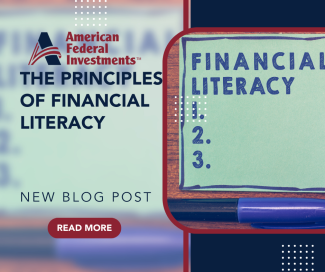
The Principles of Financial Literacy
Financial literacy refers to the skills and knowledge that allow an individual to make informed and effective decisions through their understanding of finances. Financial literacy starts by building a basic understanding of 'money matters' to create a sense of economic well-being, self-trust, and financial confidence. The principles of financial literacy include:
Saving- Saving is preparing for the future through actions such as:
- Saving consistently into a savings account
- Saving for large purchases
- Increasing your retirement savings each time you get a raise
- Having a fully-funded emergency fund with three to six months of living expenses saved
Managing debt- Managing debt includes repaying and avoiding debt through actions such as:
- Seeking out the lowest interest rates when borrowing
- Paying off credit card balances each month
- Consistently making on-time credit payments
- Avoiding bankruptcy by working with a credit counselor when debt becomes overwhelming
Investing- Investing for the future helps prepare a financially secure retirement through actions such as:
- Participating in your employer-sponsored retirement plan
- Financial planning
- Working with a financial professional
- Having adequate insurance to preserve your ‘nest egg.’
- Investing in after-tax strategies
Financial Literacy also includes having a basic understanding of how to pay bills online, manage bank accounts, manage debt, fill out income tax withholding forms at work, and other money-related actions. Where can individuals learn financial literacy?
Financial literacy through licensed professionals- A financial professional, Certified Public Accountant (CPA), or a financial literacy instructor can provide education on financial concepts to help increase financial literacy. Financial professionals should first educate to help individuals make informed decisions later.
Financial literacy at work- When employees can attend workplace classes on budgeting, saving, and investing, they are more likely to save for retirement and not live beyond their means. These classes are commonly conducted by the financial professional that oversees the company’s retirement plan, the HR Department, and other financial literacy educators.
Financial literacy at school- Currently, 23 states require a financial literacy class to graduate from high school (2022 Survey of the States). Financial literacy experts know that teaching students how to manage their income and expenses and giving them a basic understanding of financial concepts will enable them to have financial success regardless of their future income.
Having trained teachers who know financial literacy content can help develop better credit behaviors early, even if offered through the school system, which leads to making on-time payments and understanding how to manage debt and credit.
Financial literacy through free resources- Look for free tools available to you through your bank or credit card company to help you monitor your spending and credit score. Also, check online for financial literacy apps through The Motley Fool’s Best Financial Literacy Apps for 2022.
Financial literacy affects all ages and all socioeconomic levels. It’s up to all of us to improve financial literacy here in the U.S. if we are to move away from being a debt-ridden society and toward being a society with financial security.
Important Disclosures
The opinions voiced in this material are for general information only and are not intended to provide specific advice or recommendations for any individual.
All information is believed to be from reliable sources; however LPL Financial makes no representation as to its completeness or accuracy.
This article was prepared by Fresh Finance.
LPL Tracking # 1-05259889

